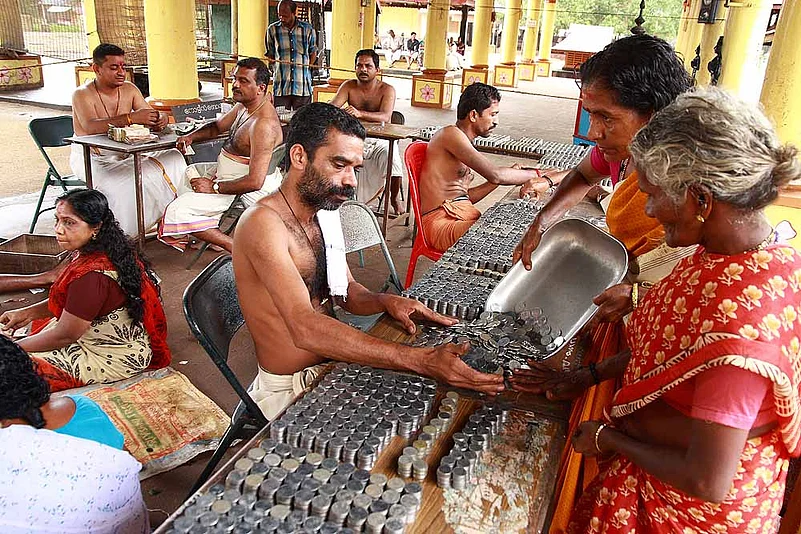India’s Wealthiest Temples...
- Padmanabhaswamy Temple, Kerala
- Vaishno Devi, J&K
- Somnath, Gujarat
- Siddhi Vinayak, Maharashtra
- Meenakshi Temple, Madurai
- Jagannath Temple, Orissa
- Kashi Vishwanath, UP
- Amarnath, J&K
And A Reluctance To Disclose Wealth
- People donate gold to temples out of faith—some equate it to charity.
- Many scams at temples, from the Tirupati dollar scam to the theft of a silver trident at Kashi Vishwanath, have led to CCTVs but little else.
- Temples don’t know how much gold they own—few questions asked.
***
In 2011, the Orissa police found 70 tonnes of silver at a matth in Puri. The mahant had to be arrested for having spirited some away. In Kerala, under the watch of the Supreme Court, a $20 billion treasure was counted out at the Sree Padmanabhaswamy temple in Thiruvananthapuram. One vault still lies unopened, protected by local superstition that unlocking it will trigger a calamity. This year, acting on a Hindu seer’s vision, the ASI dug up a ruined palace in Unnao district in Uttar Pradesh looking for gold—but found nothing.
Treasure hunts in temples and palaces seemed good enough reason for the Reserve Bank of India (RBI) to ask temples exactly how much gold they have lying around. It has recently sent notices asking temples to account for their holdings, raising a storm among temple trusts and Hindu outfits. Rebuffed, the RBI has retreated. “It’s true the RBI sent notices to temples. They later said they are no longer seeking this information,” says Ram Madhav, spokesperson for the RSS. “The RBI’s letter naturally aroused suspicion. The economy is going through a difficult time. We don’t want the government to go after temple wealth.”
India’s fascination for gold is legion, but Indians prefer to hoard it, not use it. This seems particularly true of Hindus, who donate gold to temples in large albeit unknown quantities. In February, an RBI working group headed by K.U.B. Rao noted: “Temples in India hold large quantities of gold jewellery offered by devotees to the deities.” The report did not quantify the gold and Indian temples have never seen a comprehensive audit.
Another RBI study found that around 60 per cent of India’s gold buyers are rural. Indeed, wealthy urbanites give less than poor, rural devotees in several temples interviewed, including Mansa Devi, Kashi Vishwanath, Somnath, Padmanabhaswamy and Sabarimala. “Poor rural women offer their gold necklaces, nose-pins and ear-rings to the deity in large numbers,” says Sajjan Singh Hooda, secretary of the board that runs Mansa Devi. He couldn’t say how much gold the temple owns but said it collected a cool Rs 1.2 crore at this year’s navratra festival. Mansa Devi has been through a “clean-up”, Hooda says, after which annual donations zoomed from Rs 4 crore in 2006 to Rs 13 crore last year.
At Somnath too, the temple has an annual turnover of Rs 15 crore, aside from land and buildings, but Dilip Chavda, one of the managers, said he “doesn’t know the exact amount” the temple has in its coffers. The temple uses advanced software to keep track of donations as well as CCTV cameras to prevent theft and siphoning off.

The Padmanabhaswamy temple
Though it’s common for temples to not know the size of their gold holding, the Indian love affair with gold is no secret. Escalating prices or import controls in a troubled economy haven’t dampened demand. “If people get a feeling that the government doesn’t have enough gold, they hold on to their gold even more,” says Somasundaram P.R., managing director, WCG India, explaining the gold bond debacles of 1962, 1965 and 1980. He says the solution is to come up with ways to monetise people’s gold over time—trying to wrest it out of their hands during a crisis will just not work.
Considering the attachment to gold, why Hindus donate to temples remains a mystery. “Even we wonder why Hindus don’t blink before giving gold worth lakhs to temples. They certainly don’t donate to research, even if they are convinced about it,” says Saroj Bala, who heads Iserve in Delhi, an outfit dedicated to dating Hindu texts such as the Ramayana. Bala, a former IRS officer, believes some gold donated to temples was not “earned in white”. As a tax official, she also ran into businessmen who felt tax money is wasted due to inefficiency or corruption. “The same people, however, ignore how temples manage or mismanage donations,” she says.
Historically, in the Hindu scheme of things, gold could only be given to divinities or to the king, explains Prof Jyotirmaya Sharma, who teaches political science at Hyderabad University. That’s why kings gave their wealth to temples, as at Padmanabhaswamy. In the past, misuse of temple wealth amounted to a sin. Today, transparency and objectivity are the buzzwords, but without a similar moral code. “The old code is gone, the new is not working. What remains is Hindu memory of the past and people continue to gift gold to their gods,” says Sharma.
Accountability, the kind RBI sought, stirs up thorny legal issues as well. God is a perpetual minor in Indian law, giving priests the right to represent deities in court as the “father”. RBI doesn’t have legal writ over temples—that lies with temple trusts or boards, managed under state laws relating to religious endowments. Rahul Easwar, grandson of the supreme priest of Sabarimala temple, is firmly against government handling temple wealth. “The deity owns the temple wealth. Yes, gold should be used for social good, but politicians and the bureaucracy must be kept out,” he says. He argues that elected leaders represent people of all faiths, not just Hindus, and so should be kept off temples.
Indeed, when it comes to temples, people don’t always relate to the government’s views on ‘better management’. “Regulating and reforming temples means the government must be ready to face its own weaknesses, including corruption,” argues the rss’s Madhav. Devotees often clamour for temples (or, as at Unnao, the king’s descendants) to keep any gold that may be found. This makes temple boards with government presence extremely cautious. Padmanabhaswamy temple CEO Bhuvanendran Nair says, “Temple wealth should be spent in a reasonable and justifiable way. What happens to the gold is a very emotional issue. We use the funds to do what devotees consider necessary.”
The occasional treasure, seen along with a slew of reports on mismanagement at temples, makes experts favour a close accounting. “There is absolutely no argument otherwise. There has to be inventory and it must be transparent,” says Prof Sharma. Chandramauli Upadhyay, a trustee at Kashi Vishwanath, agrees. “Many people use temple wealth for personal purposes. The gold and money in temples is a public resource. The government must manage it, and for public good,” he says. Here, too, donations grew—nearly five-fold—after CCTV cameras were installed a few years ago.
Experts say looking for hidden treasure is like hunting for the proverbial black cat in a dark room. “Sometimes you go looking for a cat but find a rat,” quips one gold expert who didn’t want to be identified. In other words, a comprehensive audit could lead to nothing but skeletons—just like in Unnao.


























